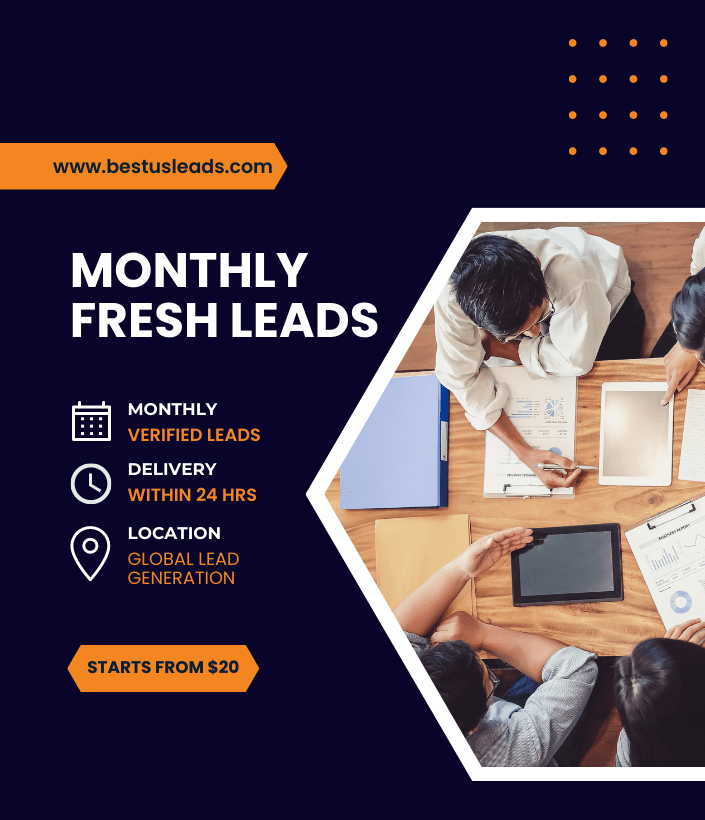In the competitive world of business, success often hinges on the ability to secure a consistent stream of quality leads. Leads are potential customers who have shown interest in your products or services, and converting them into paying clients is the lifeblood of any enterprise. In this article, we will explore the importance of business leads, effective strategies for generating them, and how to nurture and convert leads into loyal customers.
The Significance of Quality Business Leads
Quality business leads are not just names on a list; they represent individuals or companies genuinely interested in what you offer. Here's why generating quality leads is paramount:
Higher Conversion Rates: Quality leads are more likely to convert into paying customers because they have already expressed an interest in your product or service.
Cost-Efficiency: Targeting the right audience reduces marketing expenses by eliminating uninterested prospects, making your marketing efforts more cost-effective.
Revenue Growth: Converting quality leads contributes directly to revenue growth, as they bring in new business and increase sales.
Brand Loyalty: Building relationships with leads and providing value can lead to long-term customer loyalty, fostering repeat business and referrals.
Effective Strategies for Generating Business Leads
Content Marketing: Create high-quality, valuable content that addresses the pain points and interests of your target audience. This includes blog posts, ebooks, videos, webinars, and more. Promote this content through your website, social media, and email marketing.
Search Engine Optimization (SEO): Optimize your website for search engines to increase its visibility in search results. This will help potential leads find your business when searching for relevant products or services.
Social Media Marketing: Utilize social media platforms to engage with your audience, share valuable content, and build a community around your brand. Social media advertising can also be an effective way to reach a broader audience.
Email Marketing: Build and segment your email list to send targeted messages to specific groups of leads. Provide valuable content, promotions, and personalized recommendations to nurture leads over time.
Pay-Per-Click (PPC) Advertising: Use platforms like Google Ads and social media advertising to target specific keywords and demographics, driving traffic and leads to your website.
Networking and Referrals: Attend industry events, join professional organizations, and establish relationships with peers and customers who can refer leads to your business.
Lead Magnets: Offer valuable resources, such as ebooks, templates, or webinars, in exchange for a lead's contact information. This strategy helps build your email list.
Online Contests and Giveaways: Organize online contests or giveaways that require participants to provide their contact information. Ensure that the prizes align with your target audience's interests.
Customer Reviews and Testimonials: Encourage satisfied customers to leave reviews and testimonials on your website and other review platforms. Positive social proof can attract new leads.
Content Syndication: Share your content on industry-specific websites, platforms, or newsletters to reach a broader audience and generate leads interested in your niche.
Nurturing and Converting Business Leads
Generating leads is just the first step; effectively nurturing and converting them is equally important. Here's how to do it:
Lead Scoring: Assign scores to leads based on their interactions with your content and website. Focus your efforts on leads with higher scores, as they are more likely to convert.
Segmentation: Divide your leads into segments based on factors such as demographics, behavior, and interests. This allows for personalized messaging and content tailored to each group.
Drip Email Campaigns: Send automated email series to nurture leads over time. These campaigns can provide valuable information, address common questions, and gently guide leads toward conversion.
Lead Qualification: Develop a clear process for identifying and qualifying leads. Not all leads are ready to buy immediately, so understanding their stage in the buyer's journey is crucial.
Lead Follow-Up: Timely and persistent follow-up is essential. Respond to inquiries and engage with leads promptly, addressing their needs and questions.
Content Personalization: Customize your communications and content to match the specific interests and needs of each lead segment.
Clear Call-to-Actions (CTAs): Make it easy for leads to take the next step by including clear CTAs in your content, emails, and website.
Landing Pages: Design dedicated landing pages for lead-generating offers. These pages should be optimized for conversions and provide a clear path for leads to take action.
Social Proof: Showcase customer reviews, testimonials, case studies, and success stories to build trust and credibility.
A/B Testing: Continuously test and optimize your lead generation and nurturing strategies to improve conversion rates.
For more info:-





Comments